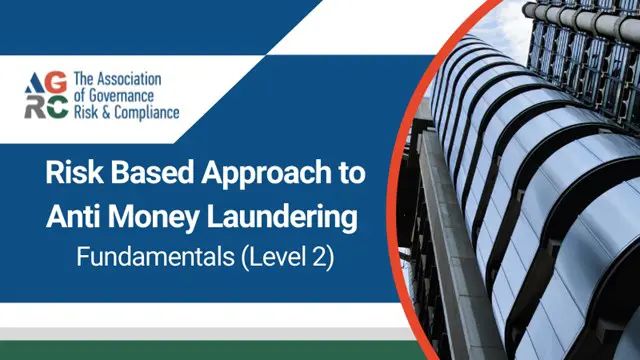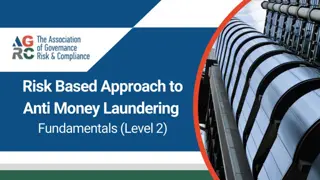
Risk Based Approach (RBA) to Anti Money Laundering
AGRC Fundamentals (Level 2)
London Governance & Compliance Academy
Summary
Add to basket or enquire
Overview
This course aims to describe and explain the risk-based approach (RBA) procedures so that organizations focus their efforts on those areas where the risk of money laundering (ML) and terrorist financing (TF) appears to be higher. In other words, resources should be efficiently invested and applied where they are most required.
Description
The risk-based approach (RBA) is central to the effective implementation of the Financial Action Task Force (FATF) recommendations. This means that supervisors, financial institutions, and intermediaries should be able to identify, assess, and understand the risks related to money laundering and terrorist financing to which they are exposed, and implement the most appropriate mitigation measures.
This course includes a general presentation of the RBA and provides specific guidance using risk criteria such as country or geographic risk, customer risk, and product or service risk. In addition, examples of risk factors under each of these categories are provided.
Course Content
- Risk Assessment for Money Laundering (ML)
This unit describes the need for combating ML risks and other financial crimes. Financial institutions must be able to respond to threats on a contextual basis to balance efficiency and cost needs with compliance obligations.
- Risk-Based Approach (RBA)
This unit describes the RBA methodology when assessing risk according to the FATF recommendation. This considers risks related to types of customers, countries or geographic areas, and particular products, services, transactions, or delivery channels.
- Assessing and Managing the ML/TF Risk
A risk assessment enables financial institutions to focus on their AML/CFT efforts and adopt appropriate measures to allocate the necessary resources in an optimal way. Based on the assessments conducted, the financial institutions should have controls, policies, and procedures that allow them to effectively manage and mitigate the risks identified.
- Simplified and Enhanced Due Diligence Measures
According to FATF recommendation 1, where higher risks are identified, financial institutions and Designated Non-Financial Businesses and Professions (DNFBPs) should be required to take enhanced measures to manage and mitigate risks.
- AML Case Studies
This final unit will offer a practical perspective by reviewing recent cases where financial institutions failed to adopt efficient risk-based AML mechanisms.
Who is this course for?
This course is addressed to all individuals who practice AML such as compliance and/or AML managers in banks, investment firms, investment funds, ASPs, trust service corporate providers, and lawyers.
Requirements
No prerequisites are required to attend this course.
Questions and answers
Currently there are no Q&As for this course. Be the first to ask a question.
Reviews
Currently there are no reviews for this course. Be the first to leave a review.
Legal information
This course is advertised on reed.co.uk by the Course Provider, whose terms and conditions apply. Purchases are made directly from the Course Provider, and as such, content and materials are supplied by the Course Provider directly. Reed is acting as agent and not reseller in relation to this course. Reed's only responsibility is to facilitate your payment for the course. It is your responsibility to review and agree to the Course Provider's terms and conditions and satisfy yourself as to the suitability of the course you intend to purchase. Reed will not have any responsibility for the content of the course and/or associated materials.


